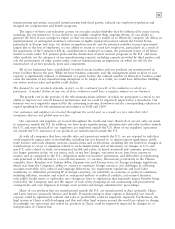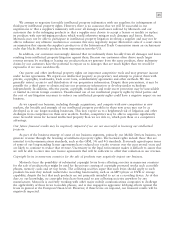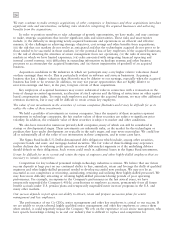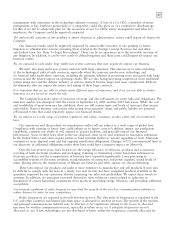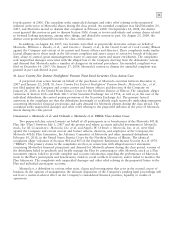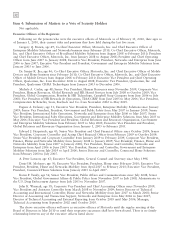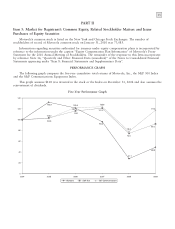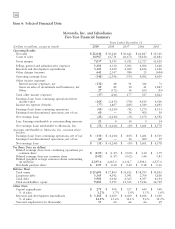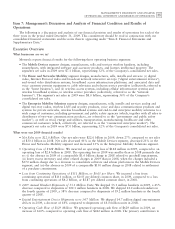Motorola 2009 Annual Report Download - page 36
Download and view the complete annual report
Please find page 36 of the 2009 Motorola annual report below. You can navigate through the pages in the report by either clicking on the pages listed below, or by using the keyword search tool below to find specific information within the annual report.
28
such use. Industry growth has been and may continue to be affected by the cost of new licenses required to use
frequencies and any related frequency relocation costs.
The U.S. leads the world in spectrum deregulation, allowing new wireless communications technologies to be
developed and offered for sale. Examples include wireless local area network systems, such as WiFi, mesh
technologies and wide area network systems, such as WiMAX and LTE. Other countries have also deregulated
portions of their available spectrum to allow deployment of these and other technologies. Deregulation may
introduce new competition and new opportunities for Motorola and our customers.
Changes in government policies and laws or economic conditions may negatively impact our financial results.
Our results may be affected by changes in trade, monetary and fiscal policies, laws and regulations, or other
activities of U.S. and non-U.S. governments, agencies and similar organizations. Our results may also be affected
by social and economic conditions, which impact our operations, including in emerging markets in Asia, India,
Latin America and Eastern Europe, and in markets subject to ongoing political hostilities and war, including the
Middle East.
In addition, the laws and regulations that impact access to, content on or commerce conducted on the
Internet are still evolving. We could be negatively impacted by any such regulation in any country where we
operate, including under the new presidential administration in the U.S. The adoption of such measures could
decrease demand for our products and at the same time increase the cost of selling such products.
We rely on complex information technology systems and networks to operate our business. Any significant system
or network disruption could have a negative impact on our operations, sales and operating results.
We rely on the efficient and uninterrupted operation of complex information technology systems and
networks, some of which are within Motorola and some are outsourced. All information technology systems are
potentially vulnerable to damage or interruption from a variety of sources, including but not limited to computer
viruses, security breach, energy blackouts, natural disasters, terrorism, war and telecommunication failures. There
also may be system or network disruptions if new or upgraded business management systems are defective or are
not installed properly. We have implemented various measures to manage our risks related to system and network
disruptions, but a system failure or security breach could negatively impact our operations and financial results.
In addition, we may incur additional costs to remedy the damages caused by these disruptions or security
breaches.
Our share price has been and may continue to be volatile.
Our share price has been volatile due, in part, to generally volatile securities markets, and the volatility in the
telecommunications and technology companies’ securities markets in particular. Factors other than our financial
results that may affect our share price include, but are not limited to, market expectations of our performance,
spending plans of our customers, and the level of perceived growth in the industries in which we participate.
In our Mobile Devices business specifically:
We have had substantial operating losses in each of the last three years and may continue to incur losses as we
continue to reposition our Mobile Devices business.
In each of the last three years, Motorola had substantial operating losses as a result of the financial
performance of our Mobile Devices business. While we have plans in place intended to improve the performance
of this business, we cannot be certain that we will be successful or that this business will be profitable in 2010.
The worldwide wireless mobile handset market contracted in 2009 compared to 2008 and further declines in this
worldwide market could negatively impact transition plans for our Mobile Devices business.
In 2009, worldwide wireless handset industry unit shipments declined by approximately 6%. This is the first
annual decline in industry handset unit shipments since 2001. A declining mobile handset market in 2010,
particularly if it impacts smartphone sales, may make it more difficult to improve the performance of our Mobile
Devices business.
Our strategy for the Mobile Devices business may be too concentrated on certain products.
The product portfolio in the Mobile Devices business is extensively targeted at the smartphone market, with
particular concentration on smartphones using an Android-based operating system. These products are an
important part of the business plan. If such Android-based smartphones do not remain competitive in the
marketplace, our financial performance would suffer and a shift in strategy would be costly and difficult.





